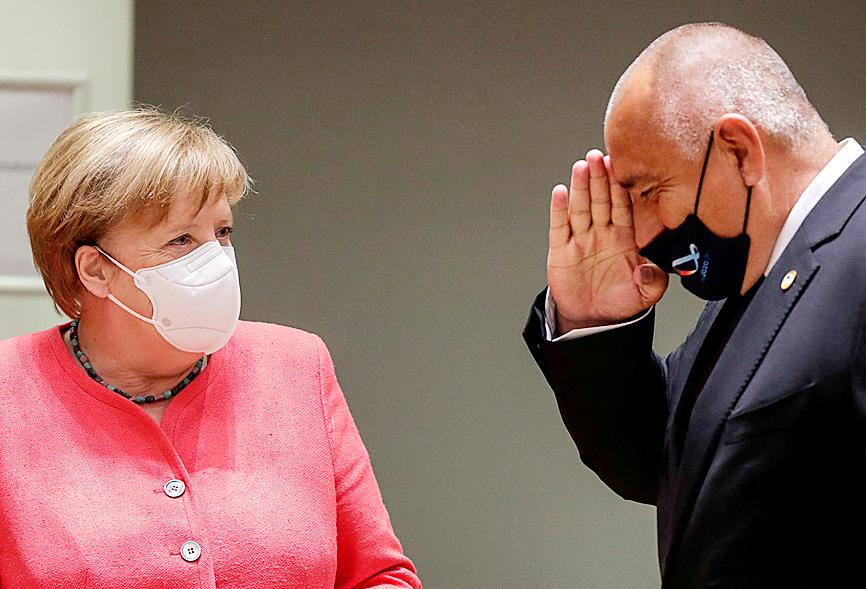Germany is the most admired country in the world for the third year running, leaving the US in a tight battle for distant second place with China and Russia, according to a new global leadership poll.
The annual Gallup poll, conducted last year, casts more doubt on US Secretary of State Mike Pompeo’s claim on Friday that the US was “perfectly positioned” to lead the free world in a new ideological rivalry with the Chinese Communist Party.
The US had a 33 percent global approval rating for last year, just 1 percentage point ahead of China and 3 percent ahead of Russia.

Photo: Reuters
Germany outshines all three by a long stretch, with a 44 percent rating.
The survey of 1,000 adults in each of 135 countries was carried out before the COVID-19 outbreak began.
Washington’s global standing could suffer even further in light of its mismanagement of the pandemic, which has left the US as one of the worst hotspots for the disease.
US President Donald Trump has frequently claimed that he has made the US respected again in the world, but the poll figures suggest the opposite.
The US was the most admired country in the world for every year former US president Barack Obama’s administration except one (when it came a close second to Germany in 2011), but then its popularity plummeted 18 percentage points after Trump took office, recovering marginally after that at just over 30 percent.
“When you read the latest results in this report on how the world rates the leadership of major global powers, the leaders who presented the case for the most certainty did the best,” Gallup’s editor-in-chief Mohamed Younis said.
“Longtime German Chancellor Angela Merkel, loved or hated, has been one of the most predictable leaders in highly uncertain times in both Europe and the global order,” he said.
COVID-19 could erode the US’ stature even more, he said.
“The image of US leadership in particular could seriously suffer as the globe watches US states and the federal government struggle to get infection rates under control,” he said.
US leadership approval is at its lowest among the country’s traditional allies in Europe, where 61 percent disapprove of its performance and just 24 percent approve. In the UK, the figures are 65 percent disapprove — 25 percent approve, with a similar outcome in France.
In Germany, US stature is even worse: 78 percent disapprove and only 12 percent admire the leadership coming from Washington.
In Australia too, there was deep skepticism about the US, with 67 percent disapproving compared with 23 percent approval.
The only continent where the US has maintained an overall positive image is Africa, where a bare majority of 52 percent approved its conduct, but that too is way down from the 85 percent backing Africans gave to the US in 2009, just after Obama’s election.

CALL FOR SUPPORT: President William Lai called on lawmakers across party lines to ensure the livelihood of Taiwanese and that national security is protected President William Lai (賴清德) yesterday called for bipartisan support for Taiwan’s investment in self-defense capabilities at the christening and launch of two coast guard vessels at CSBC Corp, Taiwan’s (台灣國際造船) shipyard in Kaohsiung. The Taipei (台北) is the fourth and final ship of the Chiayi-class offshore patrol vessels, and the Siraya (西拉雅) is the Coast Guard Administration’s (CGA) first-ever ocean patrol vessel, the government said. The Taipei is the fourth and final ship of the Chiayi-class offshore patrol vessels with a displacement of about 4,000 tonnes, Lai said. This ship class was ordered as a result of former president Tsai Ing-wen’s (蔡英文) 2018

‘SECRETS’: While saying China would not attack during his presidency, Donald Trump declined to say how Washington would respond if Beijing were to take military action US President Donald Trump said that China would not take military action against Taiwan while he is president, as the Chinese leaders “know the consequences.” Trump made the statement during an interview on CBS’ 60 Minutes program that aired on Sunday, a few days after his meeting with Chinese President Xi Jinping (習近平) in South Korea. “He [Xi] has openly said, and his people have openly said at meetings, ‘we would never do anything while President Trump is president,’ because they know the consequences,” Trump said in the interview. However, he repeatedly declined to say exactly how Washington would respond in

WARFARE: All sectors of society should recognize, unite, and collectively resist and condemn Beijing’s cross-border suppression, MAC Minister Chiu Chui-cheng said The number of Taiwanese detained because of legal affairs by Chinese authorities has tripled this year, as Beijing intensified its intimidation and division of Taiwanese by combining lawfare and cognitive warfare, the Mainland Affairs Council (MAC) said yesterday. MAC Minister Chiu Chui-cheng (邱垂正) made the statement in response to questions by Democratic Progressive Party (DPP) Legislator Puma Shen (沈柏洋) about the government’s response to counter Chinese public opinion warfare, lawfare and psychological warfare. Shen said he is also being investigated by China for promoting “Taiwanese independence.” He was referring to a report published on Tuesday last week by China’s state-run Xinhua news agency,

‘ADDITIONAL CONDITION’: Taiwan will work with like-minded countries to protect its right to participate in next year’s meeting, the foreign ministry said The US will “continue to press China for security arrangements and protocols that safeguard all participants when attending APEC meetings in China,” a US Department of State spokesperson said yesterday, after Beijing suggested that members must adhere to its “one China principle” to participate. “The United States insists on the full and equal participation of all APEC member economies — including Taiwan — consistent with APEC’s guidelines, rules and established practice, as affirmed by China in its offer to host in 2026,” the unnamed spokesperson said in response to media queries about China putting a “one China” principle condition on Taiwan’s